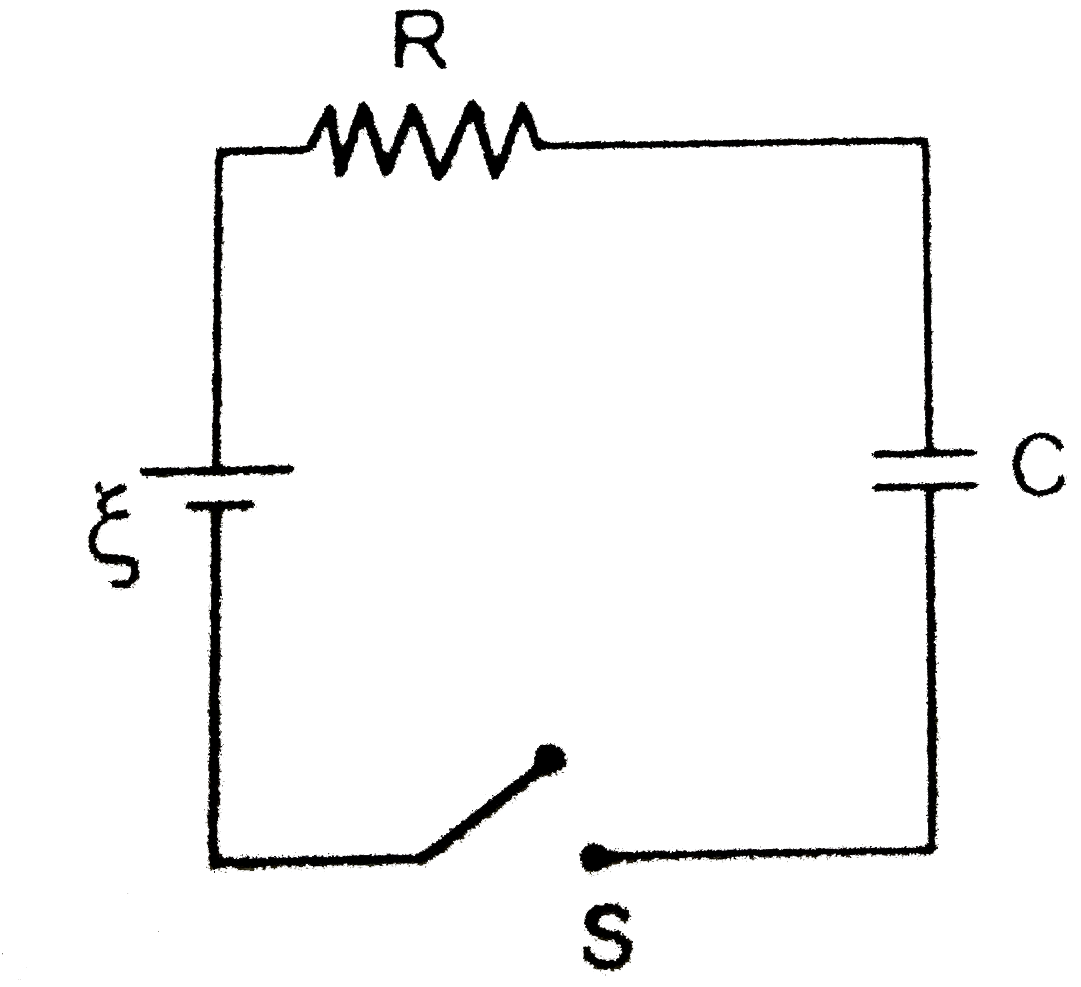A capacitor of capacitance C is connected to a battery of emf (ε)at t=0 through a resistance R. Find the maximum rate at which energy is stored in the capacitor. When does the rate has this maximum value?
To solve the problem step by step, we will follow the outlined procedure to find the maximum rate at which energy is stored in the capacitor and the time at which this maximum rate occurs.
1. Understanding the Problem:
- We have a capacitor of capacitance C connected to a battery with emf ϵ through a resistor R at t=0.
- We need to find the maximum rate at which energy is stored in the capacitor and the time at which this maximum occurs.
2. Charge on the Capacitor:
- The charge Q on the capacitor at any time t is given by:
Q(t)=Cϵ(1−e−tRC)
3. Energy Stored in the Capacitor:
- The energy E stored in the capacitor is given by:
E=12Q2C
- Substituting Q(t) into the energy formula:
E(t)=12C(Cϵ(1−e−tRC))21C
- Simplifying this, we get:
E(t)=12Cϵ2(1−e−tRC)2
4. Rate of Energy Storage:
- The rate at which energy is stored in the capacitor is given by:
r=dEdt
- Differentiating E(t):
r=ddt(12Cϵ2(1−e−tRC)2)
- Using the chain rule:
r=Cϵ2(1−e−tRC)(ddt(1−e−tRC))
- The derivative of 1−e−tRC is:
1RCe−tRC
- Therefore:
r=Cϵ2(1−e−tRC)(1RCe−tRC)
- This simplifies to:
r=Cϵ2RCe−tRC(1−e−tRC)
- Further simplifying gives:
r=ϵ2Re−tRC(1−e−tRC)
5. Finding Maximum Rate:
- To find the maximum rate, we set drdt=0.
- We differentiate r with respect to t and set the result to zero.
- After differentiation and simplification, we find the condition for maximum rate:
e−tRC=12
- Taking the natural logarithm of both sides:
−tRC=ln(12)
- Solving for t:
t=RCln(2)
6. Maximum Rate Value:
- Substitute t=RCln(2) back into the expression for r to find the maximum rate of energy storage.
Final Answer:
- The maximum rate at which energy is stored in the capacitor occurs at:
t=RCln(2)
- We have a capacitor of capacitance C connected to a battery with emf ϵ through a resistor R at t=0.
- We need to find the maximum rate at which energy is stored in the capacitor and the time at which this maximum occurs.
- The charge Q on the capacitor at any time t is given by:
Q(t)=Cϵ(1−e−tRC)
- The energy E stored in the capacitor is given by:
E=12Q2C
- Substituting Q(t) into the energy formula:
E(t)=12C(Cϵ(1−e−tRC))21C
- Simplifying this, we get:
E(t)=12Cϵ2(1−e−tRC)2
- The rate at which energy is stored in the capacitor is given by:
r=dEdt
- Differentiating E(t):
r=ddt(12Cϵ2(1−e−tRC)2)
- Using the chain rule:
r=Cϵ2(1−e−tRC)(ddt(1−e−tRC))
- The derivative of 1−e−tRC is:
1RCe−tRC
- Therefore:
r=Cϵ2(1−e−tRC)(1RCe−tRC)
- This simplifies to:
r=Cϵ2RCe−tRC(1−e−tRC)
- Further simplifying gives:
r=ϵ2Re−tRC(1−e−tRC)
- To find the maximum rate, we set drdt=0.
- We differentiate r with respect to t and set the result to zero.
- After differentiation and simplification, we find the condition for maximum rate:
e−tRC=12
- Taking the natural logarithm of both sides:
−tRC=ln(12)
- Solving for t:
t=RCln(2)
- Substitute t=RCln(2) back into the expression for r to find the maximum rate of energy storage.
- The maximum rate at which energy is stored in the capacitor occurs at:
t=RCln(2)
Topper's Solved these Questions
- ELECTRIC CURRENT IN CONDUCTORSBOOK - HC VERMA ENGLISHCHAPTER - ELECTRIC CURRENT IN CONDUCTORSEXERCISE - questions for short answer
17 Videos
- ELECTRIC CURRENT IN CONDUCTORSBOOK - HC VERMA ENGLISHCHAPTER - ELECTRIC CURRENT IN CONDUCTORSEXERCISE - objective 2
9 Videos
- DISPERSION AND SPECTRABOOK - HC VERMA ENGLISHCHAPTER - DISPERSION AND SPECTRAEXERCISE - Question for short Answer
6 Videos
- ELECTRIC CURRENT THROUGH GASESBOOK - HC VERMA ENGLISHCHAPTER - ELECTRIC CURRENT THROUGH GASESEXERCISE - Short answer
6 Videos
Similar Questions
At the trophic level of consumers, the rate at which food energy is assimilarted, is called ?
View SolutionAn uncharged capacitor of capacitance 100μF is connected to a battery of emf 20V at t = 0 through a resistance 10Ω, then
(i) the maximum rate at which energy is stored in the capacitor is :
View SolutionAn uncharged capacitor of capacitance 100μF is connected to a battery of emf 20V at t = 0 through a resistance 10Ω, then
(i) the maximum rate at which energy is stored in the capacitor is :
View SolutionA capacitor of capacitance as C is given a charge Q. At t=0,it is connected to an ideal battery of emf (ε)through a resistance R. Find the charge on the capacitor at time t.
View SolutionA capacitor of capacitance as C is given a charge Q. At t=0,it is connected to an ideal battery of emf (ε)through a resistance R. Find the charge on the capacitor at time t.
View SolutionAn inducatane L and a resistance R are connected in series with a battery of emf epsilon. Find the maximum rate at which the energy is stored in the magnetic field.
View SolutionAn uncharged capacitor of capacitance 100μF is connected to a battery of emf 20V at t = 0 through a resistance 10Ω, then
(ii) time at which the rate has time miximum value is
View SolutionA coil having an inductance L and a resistance R is connected to a battery of emfε. Find the time elapsed before, the magnetic field energy stored in the circuit reaches half its maximum value.
View SolutionA capacitor of capacitance C has charge Q. it is connected to an identical capacitor through a resistance. The heat produced in the resistance is
View Solution
As situation shown in figure the maximum value of rate of energy stored in the capacitor after the switch is closed.
View Solution
